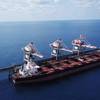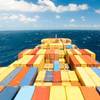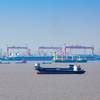A government based in eastern Libya has shipped its first cargo of crude in defiance of authorities in the capital Tripoli, a bold move that could deepen the divisions that have brought chaos since the fall of Muammar Gaddafi.
The Tripoli authorities asked the U.N. Security Council on Tuesday to blacklist the India-flagged tanker Distya Ameya, which left the eastern Libyan port of Hariga overnight carrying oil they said could not be lawfully sold.
The eastern government has set up its own National Oil Company (NOC) to act in parallel to the Tripoli-based NOC that is recognised internationally as the only legitimate seller of Libyan oil.
The tanker departed Hariga carrying 650,000 barrels of crude late on Monday and was bound for Malta, a spokesman for the eastern NOC said.
The spokesman, Mohamed al-Manfi, said it had reached international waters. The ship last reported its position through the publicly available AIS tracking system earlier on Tuesday as still in Libyan waters.
Libya's economy depends almost exclusively on oil export revenue, and the fight over who controls those funds has driven chronic instability and civil war since long-serving autocrat Gaddafi was toppled and killed by rebels in 2011.
Parallel parliaments and governments have operated in Tripoli and the east since 2014. Much of the country is in the hands of dozens of armed groups that proclaimed loyalty to one or the other of the two rival governments, while small areas are controlled by Islamic State fighters.
Political division, labour disputes and security threats have reduced Libya's output to less than a quarter of the 1.6 million barrels per day produced before the uprising.
It was not immediately clear how the eastern NOC could attempt to complete a sale, given the international opposition. One possibility might be to attempt a ship-to-ship transfer in international waters.
In 2014, a group pressing for more autonomy in eastern Libya shipped crude from Es Sider terminal, but U.S. special forces boarded it off Cyprus and forced it to return.
UN Resolutions
Authorities in Malta said the Distya Ameya did not feature on the island nation's list of expected ship arrivals. Maltese national TV said the ship was in international waters near Malta but had not been given permission to dock there.
The eastern NOC has long been trying to sell its own oil, but until now those efforts have been blocked by the NOC in Tripoli, with the support of Western countries.
The NOC in Tripoli says any sale by its eastern rival would breach U.N. Security Council resolutions and put the future of Libya's economy at risk.
NOC Tripoli officials said on Tuesday they had notified the United Nations, countries with naval forces in the Mediterranean and a unity government now working in Tripoli that the shipment had not been authorised and should be stopped.
"We have done our job and we are waiting for them to do theirs," said spokesman Mohamed al-Harari.
The NOC in Tripoli has continued to run oil production throughout the crisis that followed Gaddafi's fall, with the funds paying state salaries across Libya, including many of the rival armed groups, which have generally been granted official status.
The Tripoli NOC has retained strong international backing, and says it is working to plan future oil sales with the new U.N.-backed unity government that arrived in the capital late last month. The unity government includes figures from across Libya's divides, but has not yet been fully accepted by either of the two loose alliances fighting for power since 2014.
Parallel Institutions
News of the eastern NOC's effort to export its first shipment of oil emerged late last week, when the NOC in Tripoli said it had prevented port workers from loading oil onto the Distya Ameya.
It said the shipment had been ordered for a company called DSA Consultancy FZC, registered in the United Arab Emirates.
Two businessmen whose business cards, seen by Reuters, describe them as executives at the firm did not reply to requests for comment.
A U.N. Security Council resolution last month said the unity government had the "primary responsibility" for preventing illicit oil sales, urging it to communicate any such attempts to the U.N. committee overseeing Libya-related sanctions.
On Monday the U.S. embassy for Libya said it was "very concerned about Libyan oil purchases outside of traditional channels".
(By Ayman al-Warfalli; Additional reporting by Ahmad Gaddar and Libby George, Chris Scicluna and Aidan Lewis; writing by Aidan Lewis; editing by Peter Graff)









